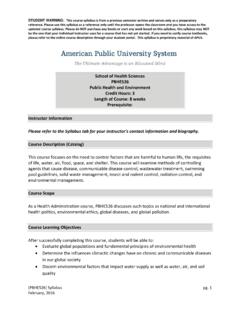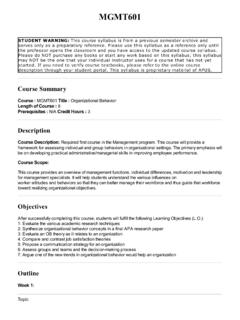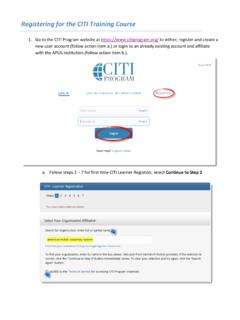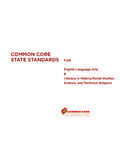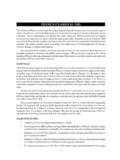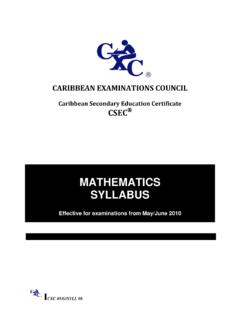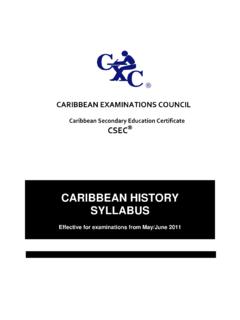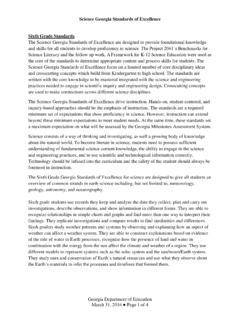Transcription of SSGS500 - American Public University System
1 SSGS500 . ST UDENT WARNING: This course syllabus is from a previous semester archive and serves only as a preparatory reference. Please use this syllabus as a reference only until the professor opens the classroom and you have access to the updated course syllabus . Please do NOT purchase any books or start any work based on this syllabus ; this syllabus may NOT be the one that your individual instructor uses for a course that has not yet started. If you need to verify course textbooks, please refer to the online course description through your student portal. This syllabus is proprietary material of APUS. Course Summary Description Course Description: This course provides basic research methods skills for addressing problems and issues specific to the programs within the School of Security and Global Studies (SSGS).
2 The course covers four basic approaches to social research including experimentation, survey research, field research, and the use of available data. Students will gain foundational knowledge in research planning, design, methodology, data collection, and analysis. This course prepares students for advanced research methods. Students in SSGS graduate studies are expected to be completely familiar with Turabian and APA writing styles. If you do not possess copies of these manuals, here is a link to the library, library/resources-services/ , specific to writing basics, that has quick style guides in use within SSGS. Purchase of the most recent writing guide in use in your program is highly recommended. If you are unsure what writing style is in use in your program consult with your academic advisor.
3 Course Scope: As part of the core requirement, this course introduces the student to foundational elements within social science research. Students will gain insight into the importance of ethical conduct when carrying out research. They will also gain familiarity with how theory and theoretical frameworks fit within overall research projects. The course will also cover qualitative and quantitative research and provide insight into how researchers can draw conclusions from their data. Students will participate in weekly Discussion Forums that correlate to weekly readings. Students will write an analytical research paper and will write a comprehensive final assignment. Objectives CO-1: Appraise the nature of social science research and scholarship as an intellectual enterprise.
4 CO-2: Evaluate research approaches, data collection methods, and their relative merits in accordance with ethical practices and standards. CO-3: Analyze the range of analytic procedures that can be employed in carrying out social science research. CO-4: Synthesize the different types of qualitative, quantitative, and mixed methods research designs. CO-5: Design empirically based studies. Outline Week 1: Introduction to Social Research Learning Outcomes CO-1. Required Readings McKinlay, John. "Appropriate Research Methods." In e-Source: Behavioral & Social Sciences Research. 1-23. Accessed October 3, 2016. Coulter, Jeff. "'Science' in the Social Sciences." In e-Source: Behavioral & Social Sciences Research. 1-18. Accessed October 3, 2016. Kelty, Miriam. "Ethical Challenges.
5 " In e-Source: Behavioral & Social Sciences Research. 1-40. Accessed October 3, 2016. Locke, Lawrence F., Stephen J. Silverman, and Waneen Wyrick Spirduso. 2010. When to Believe What You Read: The Sources of Credibility. In Reading and Understanding Research. 25-49. 3rd ed. Los Angeles, CA: Sage. Assignments 1. Week 1 forum posts 2. Graduate Orientation Recommended Optional Reading American Psychological Association. 2010. Publication Manual of the American Psychological Association. 6th edition. Washington : American Psychological Association. Belcher, Wendy Laura. 2009. Writing Your Journal Article in 12 Weeks. Sage. Bui, Yvonne N. 2014. How to Write a Master's Thesis. Sage. Locke, Lawrence F., Stephen J. Silverman, and Waneen Wyrick Spirduso. 2010. Reading and Understanding Research.
6 3rd ed. Sage. All. Prunckun, Hank. 2010. "The Intelligence Research Process." In Scientific Methods of Inquiry for Intelligence Analysis. 1st ed. 20-43. Lanham, Maryland: Roman & Littlefield. - Available in APUS Online Library. Prunckun, Hank. 2010. "Ethics in Intelligence Research." In Scientific Methods of Inquiry for Intelligence Analysis. 1st ed. 207-217. Lanham, Maryland: Roman & Littlefield. - Available in APUS Online Library. Halfpenny, Peter and Rob Procter. 2015. Innovations in Digital Research Methods. Sage. Turabian, Kate L. 2013. A Manual for Writers of Research Papers, Theses, and Dissertations. 8th ed. The University of Chicago Press. Chapter 1 and pages 131-132. Chapters 3-6. Singleton, Jr., Royce A. and Bruce C. Straits. 2010. Approaches to Social Research.
7 5th ed. Oxford University Press. McCord, Joan. 1993. Descriptions and Predictions: Three Problems for Future Criminological Research.. Journal of Research in Crime and Delinquency 30: 412. Felson, Richard B., Jeffery M. Ackerman, and Catherine Gallagher. 2005. Police Intervention and the Repeat of Domestic Assault. Report to Department of Justice. Document #210301. Baumrind, Diana. 1985. Research Using Intentional Deception: Ethical Issues Revisited. American Psychologist 40, no. 2. Recommended Media Week 2: Framing Research Learning Outcomes CO-1, CO-2, CO-3. Required Readings Alvesson, Mats and J rgen Sandberg. 2013. Constructing Research Questions: Doing Interesting Research. Sage. Chapters 1-4 (pages 1-46). DOI: Found in Sage Research Methods Database.
8 Clauser, Jerome. 2008. Types of Inquiry and the Nature of Proof. In An Introduction to Intelligence Research and Analysis. Edited by Jan Goldman. 38-50. Lanham, Maryland: The Scarecrow Press, Inc. Whittemore, Robin and Gail Melkus. Design Decisions in Research. In e-Source: Behavioral & Social Sciences Research. 1-23. Accessed October 3, 2016. 1-32. Turner, Stephen. Theory Development. In e-Source: Behavioral & Social Sciences Research. 1-23. Accessed October 3, 2016. 1-22. Assignments 1. Complete week 2 forum posts 2. CITI training 3. Graduate orientation due Recommended Optional Reading King, Gary, Robert O. Keohane, Sidney Verba. 1994. Designing Social Inquiry: Scientific Inference in Qualitative Research. Princeton University Press. Available in the APUS Online Library.
9 Prunckun, Hank. 2010. "Scientific Methods in Intelligence Research." In Scientific Methods of Inquiry for Intelligence Analysis. 1st ed. 43-53. Lanham, Maryland: Roman & Littlefield. - Available in APUS Online Library. Prunckun, Hank. 2010. "Approaches to Intelligence Research." In Scientific Methods of Inquiry for Intelligence Analysis. 1st ed. 54-60. Lanham, Maryland: Roman & Littlefield. - Available in APUS Online Library. Marshall, Catherine and Gretchen B. Rossman. 2016. Designing Qualitative Research. 6th ed. Sage. Turabian, Kate L. 2013. A Manual for Writers of Research Papers, Theses, and Dissertations. 8th ed. The University of Chicago Press. Chapter 2. Singleton, Jr., Royce A. and Bruce C. Straits. 2010. Approaches to Social Research. 5th ed. Oxford University Press.
10 Chapters 4-6. Gottfredson, Denise C. and David A. Soul . 2004. The Timing of Property Crime, Violent Crime, and Substance Use Among Juveniles. Journal of Research in Crime and Delinquency 42: 1-11. Martin, Robert A. and Richard L. Legault. 2005. Systematic Measurement Error With State Level Crime Data: Evidence from the More Guns' Less Crime Debate. Journal of Research in Crime and Delinquency 42, no 2: 187-210. Baumer, Terry L. and Kenneth Adams. 2003. Controlling a Jail Population by Partially Closing the Front Door: An Evaluation of a Summons in Lieu of Arrest' Policy. The Prison Journal 86, no. 3: 386-402. Kerbs, John J., Mark Jones, and Jennifer M. Jolley. 2009. Discretionary Decision Making by Probation and Parole Officers: The Role of Extralegal Variables as Predictors of Responses to Technical Violations.
